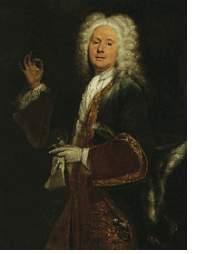|
 |
 |
 |
| Colley Cibber |
| ��B |
| �Ϥ��ӷ��Ghttp://store.yahoo.net/aliciasanchez/colcib1617.html |
| �D�n�����GDrama |
| ��ƴ��Ѫ̡GMarguerite Connor/�d�}�@ |
| ����r���GRestoration dramatist;Seminar on Restroation Drama (Spring,1997) |
|
|
|
Colley Cibber
|
Colley
Cibber
1671-1757
|
|
by Brian Moroz
|
|
Provider:
Marguerite Connor / �d�}�@
|
| �@ |
�@ |
| Colley
Cibber, born 6 November 1671, died 11 December 1757, was an actor,
playwright and theater manager during the late 1600s to the mid 1700s.
He wrote twelve comedies, six tragedies, and one tragicomedy. He also
scripted numerous musical "entertainments." His career lasted
fifty-five years and was riddled with various controversies and
critics. He began acting with no training after a rejection from
college. His first recorded acting part was in September of 1690. He
became a success after playing Lord Touchwood in the Double
Dealer (1694). When no new lead parts came as a result of
this success, he wrote one for himself in Love's Last Shift (1696).
He played Sir Novelty Fashion, a fop character, which set the trend for
his most talented performances. Perhaps his biggest writing success was
his adaptation of Shakespeare's Henry III, which
was the playing version for one hundred and fifty years. He worked in
Drury Lane theater until October of 1706 when he moved to Haymarket. In
1710 he was back again in Drury Lane, this time as a manager. While
there he was called a "greedy, hard-headed and abrasive man." Cibber's
most controversial play was his adaptation of Tartuffe in 1717. Tories
with Jacobite sympathies were very angry at his version of the play,
and Cibber was considered an enemy up to and after his death. However,
those who favored the Whig party were quite fond of the adaptation. The
last time Cibber took the stage was in his own adaptation titled Papal
Tyranny in the Reign of King John. He was booed and mocked during and
after the performance. Cibber had an interesting career with many ups
and downs. In the end he made many enemies, Alexander Pope among them.
His death in December of 1757 went nearly unnoticed by the theater
circle. |
| �@ |
�@ |
|
|
| �@ |
�@ |
|
|
|
|
